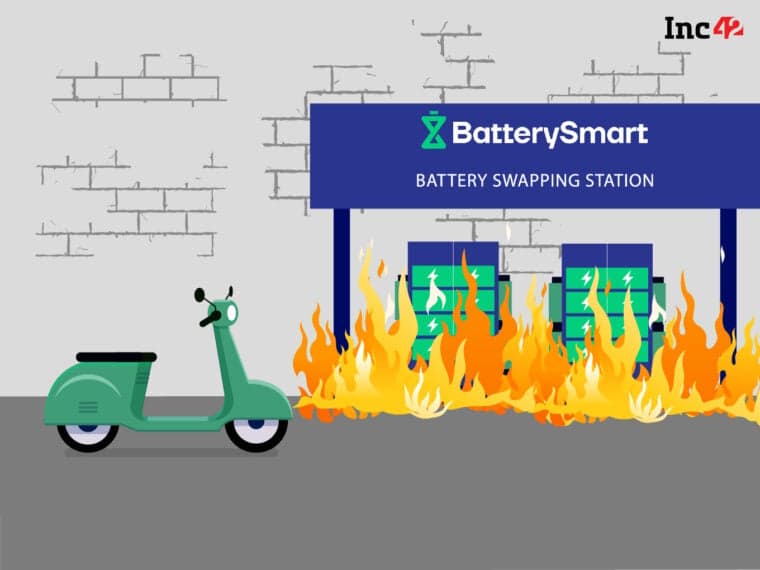
A short circuit due to a power surge resulted in two batteries at Battery Smart’s swapping facility in Delhi catching fire, which then spread and engulfed the station
The two batteries which caught fire were from the same manufacturer, Battery Smart cofounder Pulkit Khurana told Inc42, without disclosing the name of the battery maker
Earlier also multiple swapping stations of Battery Smart were involved in fire incidents. Last summer, multiple EVs were involved in fire incidents across the country
The change in battery testing norms following multiple fire incidents involving electric two-wheelers in the summer of 2022 seems to have had no impact. In a recent incident of battery fire, one of Battery Smart’s battery swapping stations caught fire on Monday (April 17) in Delhi’s Janakpuri area.
As per Battery Smart, there was a suspected power surge which led to a short circuit in the facility at around 12:40 in the afternoon on Monday. This caused a rise in the temperature of the batteries. While most of the batteries shut down, helped by smart IoT sensors in each pack, two batteries overheated and caught fire. The fire spread and engulfed the facility within minutes.
In a statement, Battery Smart said that the fire brigade arrived within 20 minutes, evacuating the building with no casualties but the property sustained some damage.
The development was first reported by YourStory. As per the report, the fire incident took place between 12.30 pm and 1 pm, and all battery packs were destroyed following the fire. Eyewitnesses told the publication that the fire brigade took more than an hour to put out the flames.
Speaking to Inc42, Pulkit Khurana, cofounder of Battery Smart, said that there were about 40-50 batteries at the swapping station at the time of the incident. The two batteries which caught fire were from the same manufacturer, he said, without disclosing the name of the battery maker.
“Given the incident happened in two batteries at the same point, which were from the same manufacturer and the same lot, it indicates that there were some external events…otherwise, it is unlikely for two batteries to get triggered at the same moment. All the other 40-odd batteries in the facility were able to switch on their protection when the power surge happened but these two batteries could not,” Khurana said.
He said that Battery Smart has taken all the batteries from that lot out of circulation. As per Khurana, the battery manufacturer is doing an independent analysis of the fire incident. Meanwhile, Battery Smart is also analysing the reasons behind the fire based on the past few days of IoT data available from the impacted batteries.
Founded in 2019 by Pulkit Khurana and Siddharth Sikka, Battery Smart provides battery-as-a-service to electric two- and three-wheeler customers, enabling them to swap batteries. It currently has over 500 swapping stations across more than 17 cities, including Delhi-NCR, Kanpur, and Jaipur. The startup is backed by the likes of Tiger Global, Blume Ventures, and Orios Ventures.
The fire at the swapping station was not the first such incident at a Battery Smart-operated swapping facility. In January this year, a swapping station operated by the startup caught fire in Lucknow. As per various reports, there were several other fire incidents at its facilities last year.
Besides, a Yulu battery swapping station also reportedly caught fire in Bengaluru last year.
EV Battery Fire Throwback
The summer of 2022 saw India’s EV industry being in the news for all the wrong reasons. Several electric two-wheelers manufactured by leading OEMs including Ola Electric, Okinawa Autotech, and Pure EV caught fire last year. Multiple investigations revealed issues with the batteries used in those vehicles and a lack of proper R&D.
With the fire incidents catching the government’s attention, the Bureau of Indian Standards (BIS) released performance standards for lithium-ion batteries used in EVs.
The government also brought in amendments in battery norms to prevent such fire incidents. It decided to implement the Automotive Industry Standards (AIS) 156 and AIS 038 Rev.2 standards in two phases – first phase starting from December 1, 2022, and the next from March 31, 2023.
There were three main areas of focus under the mandate – battery pack, battery management system (BMS), and the cells.
It must be noted that only the batteries manufactured and sold after April 1, 2023 are compliant with the new AIS standards. However, older batteries in circulation might not be compliant with these standards and pose a major safety concern.
Manufacturing defects, physical damages (mishandling the batteries while using and charging), and external factors like power surges and short circuits are the three main reasons behind the fire incidents with lithium-ion batteries.
“When it comes to physical damages, a lot of it can be identified through IoT data. Hence, we penalise the people who cause such damage. We have earlier deboarded customers where we have found incidents of mishandling. We also provide training to every customer before onboarding them. Every partner station goes through mandatory training and we also do rigorous audits for the partner stations,” Khurana said while speaking about the steps the startup is taking to ensure safety.
Meanwhile, EV adoption in the country is on the rise, especially in the two- and three-wheeler categories, despite the fire incidents
In 2022, electric two-wheeler registrations in India grew to 6.3 Lakh units from 1.5 Lakh in the previous year, while electric three-wheeler registrations rose to 3.5 Lakh units in 2022 from 1.6 Lakh in 2021, as per Vahan data.
So far in 2023, 2.6 Lakh two-wheeler EVs and 1.4 Lakh three-wheeler EVs have been registered.




 Fintech
Fintech Travel Tech
Travel Tech Electric Vehicle
Electric Vehicle Health Tech
Health Tech Edtech
Edtech IT
IT Logistics
Logistics Retail
Retail Ecommerce
Ecommerce Startup Ecosystem
Startup Ecosystem Enterprise Tech
Enterprise Tech Clean Tech
Clean Tech Consumer Internet
Consumer Internet Agritech
Agritech




























